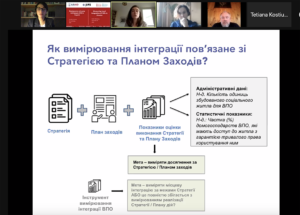The ongoing conflict in Ukraine has caused around 730,000 people to flee to other parts of the country. It has created enormous hardships for civilians, such as damaged homes and infrastructures, and difficulties to meet their basic needs and earn a living. To address the increasingly protracted nature of the displacement crisis, the Government of Ukraine launched, in January 2021, the 3-year “Strategy for internally displaced persons integration and implementation of durable solutions as to internal displacement”. The strategy aims to improve state policy in the field of the IDP protection, with IDP integration as a central tenet.
Nevertheless, critical gaps persist: the government currently lacks data to better understand the complexities involved in supporting integration efforts. It also lacks adequate tools to measure the levels of integration of internally displaced persons (IDPs) in the country. This makes it difficult to develop policy reform options and action plans that can guide effective responses.
Against this background, the Danish Refugee Council and the Danish Demining Group (DRC-DDG) initiated, in July 2020, a project titled ‘IDPs Integration Support Initiative in Ukraine’. The project focuses on strengthening the capacity of the Ministry for Reintegration of Temporarily Occupied Territories of Ukraine (MRTOT) to lead the evidence-based policy planning towards the integration of IDPs. It furthermore aims to provide technical assistance to the MRTOT to design indicators to measure IDP integration in Ukraine, based on national and international good practices.

JIPS has been requested to provide technical support to DRC, MRTOT and their project partners, which are local research institutions, to refine the above-mentioned measure for local integration of IDPs in Ukraine. This includes providing technical input to the methodologies, tools and reports from a desk review of local integration case studies; an assessment of local integration criteria and indicators relevant for Ukraine; and a review of the resulting recommendations to the MRTOT that will shape the Ministry’s measure of local integration. An on-site mission is envisaged, but will depend on partner needs and restrictions linked to the ongoing COVID-19 pandemic.
Our work builds directly on the experience and lessons learned from the recent durable solutions profiling in the Luhansk Oblast (check out our related country page and the profiling report for more details). We will also draw on the International Recommendations on IDP Statistics (IRIS), which propose two different measures to help determine for statistical purposes when an IDP has overcome key displacement-related vulnerabilities:
A capacity building and exchange workshop designed and facilitated by JIPS in November 2020 brought representatives from all project partners together to discuss the two different types of measures outlined in the IRIS, and to review their relevance for measuring local integration in Ukraine. The discussion was contextualised by a presentation of the MRTOT on their strategy for IDP integration. This set the ground for a subsequent working session, where we jointly reviewed a draft concept note on measuring integration of IDPs developed by the MRTOT.

Government representatives participating in an interactive exercise to contextualise indicators for the displacement situation in Ukraine.
Key recommendations resulting from this workshop pointed to the need for contextualising the solutions measure, based on how partners plan to use the evidence-base, and for jointly defining and agreeing on the benchmark and target for each solutions criteria and indicator. They also underlined the importance of a clear and agreed-upon definition of IDPs, distinguishing between de jure and de facto IDPs as well as considering, in separate reporting, IDP-related groups (also refer to the IRIS, section B.1).
Building on the recommendations that resulted from the workshop and were positively received by the MRTOT, DRC will further support the Ministry with the finalisation of the measure of local integration. JIPS will continue to provide technical expertise in this process.